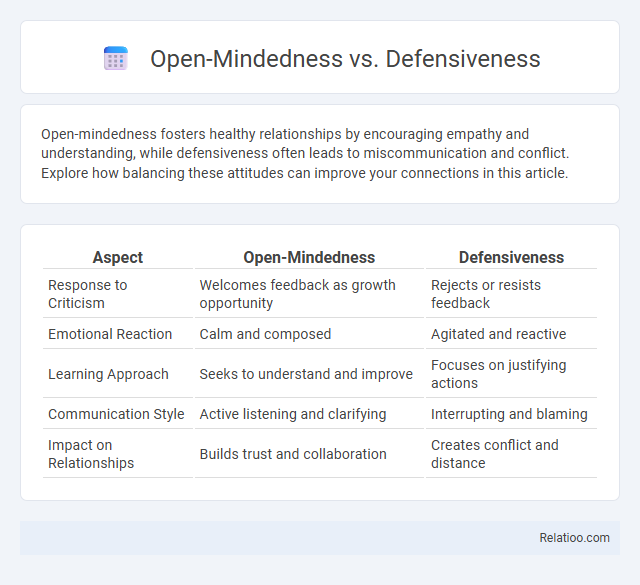Open-mindedness fosters healthy relationships by encouraging empathy and understanding, while defensiveness often leads to miscommunication and conflict. Explore how balancing these attitudes can improve your connections in this article.
Table of Comparison
| Aspect | Open-Mindedness | Defensiveness |
|---|---|---|
| Response to Criticism | Welcomes feedback as growth opportunity | Rejects or resists feedback |
| Emotional Reaction | Calm and composed | Agitated and reactive |
| Learning Approach | Seeks to understand and improve | Focuses on justifying actions |
| Communication Style | Active listening and clarifying | Interrupting and blaming |
| Impact on Relationships | Builds trust and collaboration | Creates conflict and distance |
Understanding Open-Mindedness
Open-mindedness allows you to consider diverse perspectives without immediate judgment, fostering deeper understanding and collaboration. Defensiveness, in contrast, blocks growth by creating barriers to new ideas and feedback. Listening fatigue occurs when constant exposure to information overwhelms your ability to process and engage effectively, emphasizing the need for balanced attentiveness to sustain open-mindedness.
Defining Defensiveness in Communication
Defensiveness in communication refers to the instinctive reaction to perceive comments or feedback as personal attacks, prompting protective behaviors such as denial, counter-arguing, or withdrawal. This defensive stance often hinders effective dialogue by blocking open-minded engagement and escalating misunderstandings. Recognizing defensiveness requires awareness of verbal cues like interruptions or dismissive responses and non-verbal signals such as crossed arms or avoidance of eye contact.
Psychological Benefits of Open-Mindedness
Open-mindedness promotes psychological resilience by enabling individuals to adapt to new ideas and reduce cognitive rigidity, fostering emotional flexibility and reducing stress. Unlike defensiveness, which triggers fight-or-flight responses and impedes constructive dialogue, open-mindedness encourages empathy and deeper understanding in interpersonal relationships. Listening fatigue diminishes cognitive capacity and engagement, whereas open-minded attitudes facilitate active listening, enhancing mental clarity and emotional well-being.
The Detriments of Defensiveness
Defensiveness impedes effective communication by triggering emotional barriers that block the reception of critical feedback, stalling personal growth and collaboration. This reactive stance fosters misunderstandings and escalates conflicts, diminishing trust and openness in relationships. Prolonged defensiveness can lead to listening fatigue, reducing cognitive engagement and impairing decision-making processes.
Open-Mindedness in Conflict Resolution
Open-mindedness in conflict resolution fosters a willingness to consider diverse perspectives, promoting mutual understanding and collaborative solutions. Defensiveness often blocks constructive dialogue by triggering resistance and emotional barriers, while listening fatigue diminishes the ability to process and respond effectively during prolonged disputes. Emphasizing open-mindedness encourages active engagement and empathy, transforming conflicts into opportunities for growth and innovation.
How Defensiveness Sabotages Relationships
Defensiveness sabotages relationships by blocking effective communication and shutting down openness, which prevents resolving conflicts and understanding others' perspectives. When individuals respond defensively, they create emotional distance, reduce trust, and foster resentment, undermining the foundation of healthy interactions. Listening fatigue exacerbates this issue by diminishing patience and empathy, making it harder to maintain open-minded dialogue and repair communication breakdowns.
Cultivating Open-Minded Habits
Cultivating open-minded habits involves consciously challenging cognitive biases and embracing diverse perspectives to reduce defensiveness, which often stems from perceived threats to one's beliefs. Consistent practice of active listening and mindfulness helps mitigate listening fatigue by enhancing focus and engagement, allowing individuals to process information without becoming overwhelmed or emotionally drained. Developing these habits promotes resilience and adaptability, fostering more meaningful conversations and improved interpersonal relationships.
Identifying Defensive Behaviors
Identifying defensive behaviors involves recognizing actions such as interrupting, dismissing others' viewpoints, and avoiding direct answers, which hinder open-mindedness and constructive dialogue. Listening fatigue can exacerbate defensiveness by causing mental exhaustion, reducing empathy, and increasing impatience during conversations. Developing awareness of these signs allows individuals to foster better communication by promoting active listening and reducing resistance to differing opinions.
Real-Life Examples: Open-Mindedness vs Defensiveness
Open-mindedness fosters effective communication by encouraging individuals to consider diverse perspectives, such as when a team member welcomes constructive criticism during a project review, leading to innovation and growth. In contrast, defensiveness often manifests in workplace settings where employees reject feedback, resulting in stagnation and interpersonal conflict. Listening fatigue can exacerbate these dynamics, causing individuals to disengage and miss critical insights, thereby hindering collaboration and problem-solving.
Strategies to Transition from Defensiveness to Open-Mindedness
Shifting from defensiveness to open-mindedness requires actively recognizing defensive reactions and consciously choosing curiosity over judgment. You can implement strategies such as pausing before responding, practicing empathetic listening, and reframing criticism as constructive feedback. These methods reduce listening fatigue by fostering genuine engagement and enhancing your ability to process diverse perspectives effectively.

Infographic: Open-Mindedness vs Defensiveness
 relatioo.com
relatioo.com